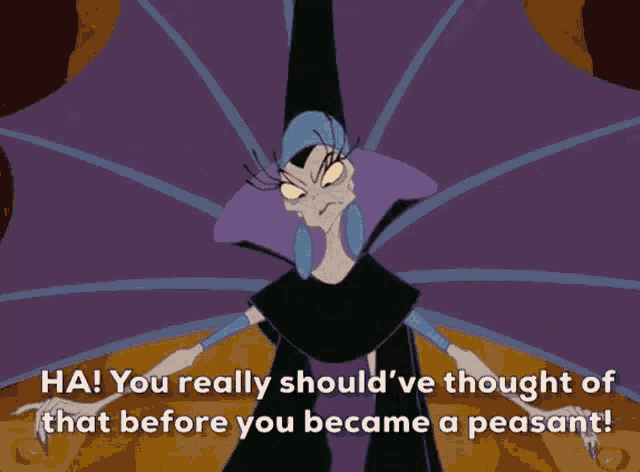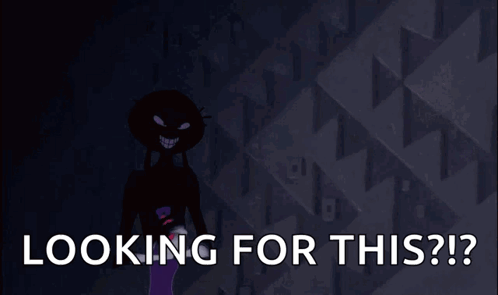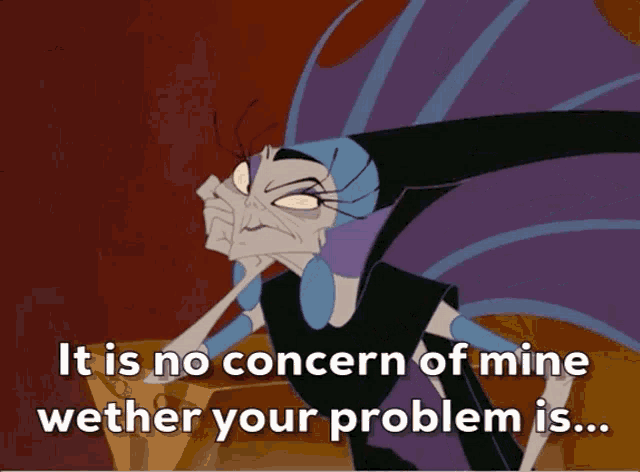Life Gets Easier Talking About It
Therapy as told by Emperor's New Groove Gifs
Seven years ago, I wrote a series of facebook posts about why I thought therapy was good and why I thought more people should use it.
Was the timing after a certain first presidency starting relevant? Yes. Yes it was. So is this one.
It was a series focused on how therapy wasn’t just for “mental illness”. You didn’t have to have a diagnosable “thing” to go. You weren’t “mad” or “crazy” (though I didnt’ use those words) to choose to go.
I asserted “I’ve never been diagnosed with a mental illness like depression or anxiety. I’ve never gone on medication. And I’ve still found therapy valuable.”
(Dana in 2024 cackles in Yzma at never being “diagnosed” with anything *checks list of growing diagnoses and meds*)
I wanted to compel people who thought they weren’t suffering enough to seek out this intervention to consider it.
I especially wanted the religious people to go. I was living in the same town as the church I’d worked at right out of college; I was in the same town of two churches I’d belonged to but no longer attended; I was neighbors with people who knew me from Bible studies I didn’t attend anymore.
I really wanted this religious contingent of my life to remember that God didn’t negate intervention.
I felt no embarrassment by my detailed declaration of needing therapy throughout my life. It felt like a non-issue. And because I found no embarrassment in it, it was easy to share in the “public view” mode on my facebook wall.
Six months later, a friend from the dance community pulled me outside at the end of a class. She held both my hands and told me that my facebook posts had motivated her to start therapy. That it was changing her life. And that she wouldn’t have felt brave enough to go except for my posts.
I didn’t know this post was pre the surge in interest in therapy. I couldn’t foresee the pending pandemic just three years in the future waiting to undo all our notions of functioning and capabilities.
I thought of all of this when I read Clare Eegan’s post from a few weeks ago about her experiences with therapy.
I think being specific and detailed about both how we found therapists AND what those experiences wrought in us matters. It can feel so murky if you’ve never done it before. And it doesn’t have to feel so mystical and weird and scary.
It’s kind of like this other post I love by Anne Helen Peterson about colonoscopies. As people, we get weird about our (literal and metaphorical) shit. Detailing the mundane steps takes all the weird anxiety out of what should be a common, normalized procedure.
So let’s talk. Let’s do some naming.
And wow do a lot of us need the help.
I have another post coming on How To Find A Therapist in the USA. It’s very detailed with questions to ask in your first session, how to even find someone to see, etc.
If my story is TLDR, start there!
Also. There is a lot of privilege throughout this story. For a detailed list of the points of privilege I see in my experiences, jump to the end of the article. Here’s a footnote link to jump you there faster →1
Therapist #1 Church Lady
The first time I went to therapy was right after I graduated from college. I was home visiting my mom and couldn't sleep because I was wracked with guilt about choices I'd made in the past year, guilt about things that I really didn't need to feel responsible for but did.
My parents separated just a few months before this and I didn't know how to grieve. I was also raising money to work for a church and the pressure was unbearable. I would get into my car and scream as hard as I could to relieve the tension.
That night, I woke my mom up and cried to her about everything. She said, "I think counseling would help you. I'll help you pay for it."
So I went.
My mentor from the campus ministry I was part of referred me to Melanie. It was the first time I'd worked with someone like that and I felt new ways of being opened up.
Looking back, it was an odd structure between us. The church I worked for owned a house that acted as its offices. I would go there twice a week for meetings. My therapist's office was inside this building. When you waited to see her, you waited in the main area that everyone walked through to go to their little corner of the house. She used white noise machines and the local NPR classical station to cover the tone of conversations. But everyone knew what you were doing in that lobby.
She also was not (and is not) licensed. I’m not sure how a non licensed therapist became the de facto referral for an entire church body containing hundreds of people. But she did.
None of this is great for safety in therapy. I do not recommend going to someone not fully licensed as an LSW, LCSW, LPC, or psychologist.
But I was oblivious and leapt in anyway.
The good news is she was very helpful at that moment in my life. We started EMDR at some point (again… was she even trained to offer this?). This is a somatic based process to loosen traumatic memories and help our brains process and store them correctly so we can decrease the hypervigilance that can accompany them.
These sessions brought up deep feelings that I’d never let myself feel. Until this point in my life, mentors and friends described me as both passionate and intellectual. I lived mostly above my neck. There was a tension in my body that represented just how little time I spent there. I had permission to feel my feelings for perhaps the first time.
This first therapist said several things that changed how I viewed my life and how I viewed my faith and what the communities have faith did to play into how I was thinking and feeling. It gave me the space to breathe and to start to find myself outside of the relationships and organizations I was affiliated with.
I started to unpack the ways I was not responsible for the pain people around me experienced, like the exboyfriend who was still very upset a year after the breakup or my parents as we suffered their early separation and pending divorce. I started to see my reactions as tied to my childhood and that the grief I had over my parents divorce was normal, that it needed more expression than it was getting.
I made it through the transition into my first job. I felt a calm settle into me. The cost of continuing to go felt high. I wrapped up after 8 or 10 sessions.
Therapist #2 University Counseling Center
The second time I started therapy was four years later in graduate school. I was faltering in my second year, scared of the Seasonal Affective Disorder that got me in the winter time.
But really, a lot was happening.
I was facing the end of graduate school in a dating relationship that couldn’t decide whether it should end or become a marriage; and also wasn’t sure how important our different religious identities were to that future plan. I was suffering from depression after a year in Bulgaria ahead of grad school. I was mid-spiritual deconstruction but didn’t realize just how permanent that process would be. And I had no idea what I would do after I finished the Masters when, I’d just realized, academia was not what I wanted to do. Everything was up in the air.
In my first meeting after intake, the therapist said, "I think your life is defined by fear and if you're ready to let that go, we can work together."
Fact: C. is the most direct therapist you will ever meet.
I went every week for the rest of that year. She changed the way I think about my internal life. I had no idea I was afraid. Which is kind of a theme in a lot of my therapists–despite being a self-reflective person, there are Names For Things that I don’t know I’d ever come to on my own. Having someone outside of me put a word to what is happening has changed my trajectory again and again.
There was a fierceness to this therapeutic process. I’m proud I showed up to the task.
Therapist #2 But This Time As My Couples Counselor
Robbie and I had also begun looking for a therapist who would see us together.
We’d had yet another confrontation where we semi-broke up.
He wasn’t sure he wanted to keep dating, much less get married. I’d assumed he was getting ready to propose (lol). We could not have been in more different places but neither of us seemed willing to totally let the other go. The base of our relationship seemed so warm and happy and caring–what was happening to us as we tried to decide on an externally facing structure?
And it turns out, C had an office in the town Robbie and I lived in. She offered to meet us as a couple.
In our first appointment, she stated, “If you continue to distrust each other the way you do now, it will soon be time to break up. If you want to put the past behind you and build something different, then we can tackle it together.”
We restarted our relationship with her help.
We learned how to actually talk.
We learned how to hear the stories behind the things we said.
I learned how to not Lawyer up, to trust that Robbie’s long silences were not spaces where he constructed a perfect PR spun lie that would make me feel better but not tell the truth about how he was.
We metabolized pain we’d caused each other in our early years together.
We’d become better people in this process. We’d become adults in our relationship rather than chaotic kids acting out our pain.
We also reached a point where we weren’t sure it was worthwhile to stay together.
But we knew that if we went separate ways, breaking up wasn’t a rejection but a celebration of what we’d had.
Reader, I married him. (And being married has been way easier and more fun than dating ever was).
I’ve been an apologist for couples counseling for dating folks since then.
But I’ve recently updated that stance.
I’ve since seen more than one couple in my life struggle in debilitating counseling experiences. And it made me realize that what we did was not couples counseling in the traditional sense.
Most couples counselors take the couple’s stated objective as the one worth working towards. How do you stay together? C. didn’t work like that. She really didn’t care if we wanted to stay together or not. She wanted us to become fully realized people and to decide, with our entire integrated self, to be together or not.
There was a freedom to our process because I actually let go of the goal of staying together. I didn’t know if we would or if I wanted to. Robbie didn’t know if he wanted to. We were trying to decide what, if anything, from our existing relationship was worth keeping and if that material was enough to build a life together.
It wasn’t always that clear. We therapied our way to that open-handed approach. And using therapy to stop clinging to something so tight it's suffocating you both? That seems pretty fantastic to me.
There’s this section of a conversation between Anna Sale (Death Sex and Money) and Orna Guralnik (Couples Therapy, Paramount+) that really reveals the structural limitations of couples therapy (emphasis mine):
Anna Sale: …Say there’s a couple where one person is clearly the dominant person in the relationship, and you know that you need to make them aware of the way that they’re bigfooting their partner in ways that are not great. And you suspect that maybe that information won’t be received warmly. How do you do that?
Orna: …I work with not only thinking about individuals when I work with a couple but I see a couple as a system. So if one person is dominating, the other person is submitting or calling for that. And if I feel like the person who’s “dominating” is not ready to tackle that dynamic, I’ll go for the complimentary part and ask the other person, “How are you doing with this?” Or I’ll find who in the couple is ready to work on something and engage them.
Anna Sale: So does that feel fair?
Orna: No, it’s often not fair. That’s a lot of what couples have to tolerate in working as a couple, because sometimes you have to lean on the person who’s ready to hear an interpretation and you let someone else off the hook for a long time, and it’s not fair. I mean, it’s good for the system overall. They have to trust that I know what I’m doing, but sometimes it’s not fair.
I think an unquestioned commitment to “staying together”, especially in traditionally presenting hetero couple structures, is a major issue. Treating something as a “system” that may not need to be or even ought to be a “system” can put one or both parties at risk of adapting to an infrastructure that is harmful. But rarely is a therapist given the permission in this dialogue to say “You can let this go” or to one person “This relationship is costing you too much.” Instead, it’s an attempt to mold oneself into a form rather than mature into a Life.
C. didn’t really care if we stayed together. And that ultimately set us free to be together.
Her nontraditional approach is also what compromised our therapeutic relationship and ended our work together.
The ethical vulnerability: C. became Robbie’s individual therapist while remaining my individual therapist and our couples counselor.
It worked till it didn’t. Robbie needed to work on some stuff specific to him outside of the context of us as a team. And he trusted C. And I trusted C. And we trusted C.
So she took this position of navigating the privacy of multiple relationships in order for that context to best inform each other’s therapeutic processes.
Two months after Robbie proposed, I learned in session that C had counseled Robbie the previous summer not to share the full details of his doubt in proposing to me. At that time, I had set a boundary that I did want to move in with him unless engagement was imminent—it was not though I thought it was and moved in. C. advised Robbie to withhold that information because she perceived (accurately) that his reasons for doubting the choice had to do with self-trust in his decisions rather than in me as a life partner.
That didn’t matter to me. In my perspective, C. had told him to lie to me.
I was hurt enough that I (briefly) considered ending the engagement with Robbie. I grew surly and sharp with C.
She saw that we’d had a therapeutic rupture; she did not think it was reparable and discharged us.
I then felt abandoned on top of feeling lied to. I wanted to keep her as my therapist. I wanted her to try. I blamed myself–it had to be my fault right?
But I think she was correct in this decision in the way she had been in many of her other choices regarding us: the hurt I experienced with her was parallel to my other traumas and therefore was unlikely to be resolved through an ongoing therapeutic process with her.
I still grieve this relationship. She changed the trajectory of my life in the most profound ways. I built a life of freedom through my work with her that cannot be accounted for any other way.
Therapist #3 Feminist Therapy
I let a year slip through me. I got married. I quit my job to start a business. I plunged into a depression that paired itself with insomnia.
It was time to find someone new.
I started my search with Psychology Today. It was my first time looking for a therapist without a direct referral or an access point through an institution like a university.
I was very particular about which bios I would call. First, I didn’t have a regular car and needed someone nearby. Second, I wanted someone who could write an interesting bio. At that time, all the Psychology Today bios were identically dull and confusing.
Lots of people never called me back. I tried some alternative options like interviewing a coach who used to be a social worker and used Brene Brown’s WholeHearted curriculum to guide people into authentic living. We met in her basement. She talked about herself the entire time. No thank you.
I found J. on Psychology Today and called her because her website was great. It wasn’t nicely designed or anything but it talked about having a “feminist approach to therapy”. I didn’t know what this meant but I knew it was something I wanted.
I’d only started identifying as a feminist a few years prior after living in Bulgaria and seeing the patriarchy cleary for the first time–seeing someone else’s problem can really help illuminate the same dynamics in your own roots. We were post Trump election and post the Women’s March (an experience I hated and never want to repeat; I can’t do crowds). We were post me finding out several guy friends I’d trusted with my vulnerabilities and brilliance voted for Trump; I questioned everything I knew about them and what it meant to be a woman who loved men, their minds, and their company. What would the cost always be to me and my safety?
Before working with J., I had never been formally diagnosed with mental illness. My tough points are more around transition. Sometimes I got what I called "head colds", two weeks of mental misery. It had never gotten to the need of meds or full out depression (or so I had thought at the time). But therapy mattered to my ability to navigate. It's helped me figure out how to be an adult, how to be me.
J. was with me for the next 1.5 years. This era marked the beginning of chronic illness, though I didn’t know that then. J. slowly showed her hand. Feminist therapy was about naming the systems around us. That how we feel might make perfect sense based on the ways our worlds were constructed. Patriarchy was real and assumed. The way I’d always felt embarrassed and defensive when friends and bosses suggested I was too critical, too demanding…
“Quick question”, she’d ask. Could I name these people? Oh, they were all men? Hmm. Interesting. I’d never been called “too much” by a woman? Hmmm. Interesting. What do we think this means?
I started to see my experiences through the lens of systems. I saw my individual experiences as expressions of larger movements. I was not alone or isolated; my feelings were not a solitary problem or project. The personal became political and vise versa–it always had been, of course, but I understood it within the details of my hyperspecific troubles in a way that hadn’t been fully present even as I asserted myself by moving in with a boy and going through the public humiliation of publicly outing myself as a sexual being.
When I felt I wasn’t working hard enough, and I never felt I was working hard enough, she questioned where I’d gotten my definitions.
Spring 2019 is when she suggested I go on an antidepressant. It took me over a month to accept this may be the right decision. I had gone into a slump and wasn’t coming back out. I felt a sense of shame that clung to me, that twisted in my stomach, that made my bones feel like they were too tightly curled to ever extend straight again.
I started meds. Zoloft, also known as sertraline.
The first effect was the dreams. I dreamed in technicolor. I dreamed the night sky opened a portal rimmed in pink. I pulled my car to the side of the road on the hills north of San Fran, the golden gate bridge just ahead. I looked above its spires through the sunset pink to the galaxies spinning through space. No waking experience was ever rendered in this plasma-screen rich detail, pixels so small as to be crystalline glimmers of stars cloudy in their density.
The dreams faded. I felt my feet hit the floor. The mess of my life was still there but I felt I had a shot of cleaning it up.
Wasn’t many months later that I took myself off the meds. I felt so good. Surely I didn’t need them? We were changing life anyway. Moving. I’d had enough of Pennsylvania. I felt trapped here. It was long past time to leave the Valley, its gray winters, its familiar social circles, its cut off feeling. I wanted to feel everything expand into the distance. I wanted life. I wouldn’t need meds while I did that.
I said goodbye to J.
We moved to DC on the the hottest day of summer 2019.
Therapist #4 Internal Family Systems
I was glimmering with possibility. I built a healthcare team. I found an endocrinologist who thought she could help me feel better.
Then October. I felt the shift in seasons and the rapid expansion of my life went too fast too far. I started to get exhausted. I’d take long hot baths and try to regroup. I felt ill, like I was wearing a wool sweater inside my body on a hot day. I raged. I couldn’t stand myself. I wanted to escape. I struggled with life functionality. Robbie kept doing what he did–everything. He cooked, he cleaned, he managed laundry, he set up our electric and gas. He encouraged me to go out and make friends.
I thought, “This isn’t right. I can’t stand it.” His every existence and competence and love felt like it was suffocating me. Or rather, I couldn’t figure out how to be a person outside of him.
I thought about leaving. I thought about finding a solo apartment. Just a few months. Just to figure out how to be an adult by myself. When had I been an adult on my own?
I’d spent all my energy to make this relationship work, to make it real. And now I was in a city that inspired and daunted me, visions of art and connection and possibility dancing through my head every night. I made next to no money while he worked in a job he mostly didn’t hate to make this move possible.
And mostly, I handled this by spiraling anytime something went vaguely wrong. I didn’t make sense to myself.
I suggested a couples counselor. I found someone online. We went. She was two miles from our apartment.
I felt an immediate ease in the room. The blue couch felt like something I’d rested in before, a nap I’d already taken. The shelves were full of organized art supplies. I saw a Brene Brown book on the shelf. I liked the lamp, the light through the windows.
I said right away how good the room felt.
The therapist replied, “Oh this isn’t my office. I use it a few days a week, subletting from another therapist.”
Which made sense. Because I hated the couples counselor. Everything she repeated back to us was just wrong. She would restate nuanced reflections on partnership with “Sounds like you are working through communication issues.”
Ummm no.
I wrote down the name of the therapist with the license on the wall, the one to whom the room belonged. I went to D’s website. She was an art therapist who also used Internal Family Systems, a method I’d learned about from my friend Susan.
D. was exactly the person I was looking for.
We ended up doing way less art than I’d originally hoped for. But the internal family systems method offered a way to engage my inner world with far more precision and attentiveness than before. A life with big feelings and confusing feelings at that, requires nuance. I got to practice negotiating between the different parts of me, all of whom wanted me to be well but had different methods of getting there. I got to practice speaking from my Self Self, practicing moving from a deep part of me rather than the loudest voice on any given day.
The process reveals the fragmentation we all live with to some degree, all the competing reactions and ideas and methods of staying safe.
I was so committed to therapy that I walked there because I didn’t have a car. I’d traverse a very hilly 40 minute trek to arrive on time. I paid out of pocket. And then treated myself to fries and a beer at the restaurant I passed on my way home. I’d call in my order ahead of time so I wouldn’t have to wait. The server started to expect me on Wednesdays.
“What do you do each week that brings you in?”
“Therapy. It’s my reward for doing the hard work.”
“Woah! My daughter wants me to go to therapy with her! Our relationship is tough. I started reading Brene Brown because she asked me to. I hope it works.”
I applauded her trying to figure out how to be the person she wants to be.
I started to navigate life with Robbie very differently. I started having conversations with the parts of me that screamed their fury each time I failed at something, each time I struggled with my energy.
And I got back on meds. Tadaaaa!
And then March 2020 arrived.
Therapist #3 Returns for a Pandemic and Pregnancy via Telehealth
Telehealth while doing guided meditations using Internal Family Systems was just not what I needed as a pandemic ripped the world apart. I wanted to talk about how it felt. I didn’t want to improve myself. I didn’t want to heal. I wanted to survive.
D. and I wrapped up after just six months together. I really thought I’d see her again in a few months.
In the meantime, I reached out to my old therapist J. New rules put in place for the health emergency meant therapists could offer support across state lines.
She’s been my therapist since then.
She was my confidant and voice of reason through my pregnancy. Throughout the realization that entrepreneurship wasn’t for me. Writing my first book. Experiencing the slow decline that came with an undiagnosed and untreated autoimmune illness. Crashing head first into the realities of no childcare in the USA and what that does to women who weren’t planning on being full time SAH. The trauma of the pandemic itself, the long isolation, the way I threw myself into building relationships with a million people across time and space. My mental health rising and falling and rising and falling. The journey with medication. The medical trauma sustained through an unwanted C Section, the overwhelm of labor, and, this year, a drug reaction that could have killed me.
No one knows my context and background better than she does.
We’ve taken a few breaks. We even had a few times we thought we’d wrapped up for good like when rules changed back and she couldn’t see me over state lines anymore—and then we moved back to PA.
It comes with strengths and limitations. Like how I can often predict what she’ll say to me (and also how helped I am every time she says it anyway lol). Or how we can operate out of old ideas of my struggles and we both get surprised by new ways of being. She has always thought better of me than I thought of myself–just this year, as some things found new steadiness, I started to journal things that celebrated me. I realized it was partially her voice finally integrated into my own, the celebration of my bravery. I do see myself in her eyes more often than I used to. I am brave. I am capable.
Having a regular, committed therapist in a long term therapeutic relationship has made that integration possible.
We spend most of our time not unearthing the big stuff and instead making sense of day-to-day life. It’s a beautiful relationship.
Therapist #5 Sleep Therapy and CBT
I had known Alissa Yamasaki for many years at the point I called her for help. We’d met in a business support group for women in the town I used to live in. I always liked her presence and insight in the group. I’d even referred people to her over the years.
But my own sleep, however rocky, didn’t make me think I needed help until after I had an autoimmune diagnosis in December 2023.
My sleep had derailed further that entire preceding year as I grew sicker. I reached points of exhaustion that meant I could not get out of bed in the mornings until well after 10, even though I went to bed around 9:30 each night. I wrestled with insomnia and restless leg that battled for which could disrupt my sleep more. I abdicated all involvement with my daughter’s repeated nighttime wakings.
You can hear more of the sleep story in this post.
How I Started Sleeping Again
"When the cathedrals you build are invisible, made of perspectives and ideas, you forget you are inside them and that the ideas they consist of were, in fact, MADE, constructed by people who analyzed and argued and shifted our assumptions. They are the fruit of labor.”
I was able to schedule with her easily. We worked together by telehealth. Insurance wasn’t an issue because her specialty and our topic of engagement did not overlap with what I was working on with my regular therapist J.
This was my first time in a behavioral modification therapeutic model. The goal was not to medicate my issue away or to identify an underlying mental health problem. It was to change how I thought about sleep (cognitive behavior) and to change my choices and patterns of sleep (behavior modification).
I’d avoided this model of therapy for some good reasons. Mostly, I didn’t want to be told how to do anything at all. And I didn’t want the false positivity that can sneak in when the model asserts your thinking is all to blame.
That’s not what I found here. At all. Again, you can read the whole process at this post, but I found Alyssa to be compassionate and insightful. She wasn’t making me do anything. She offered adjustments that we implemented slowly. It was as much observing my sleep and my choices and thinking around sleep as it was “doing” anything. There was a mindfulness underneath the adjustments that was illuminating to lots of ways the stories I told myself actively stopped me from getting what I needed.
This therapy approach was truly life changing. We worked together for six months until my sleep stabilized and I felt confident in managing sleep fluctuations in the future.
Therapist #6 EMDR and Art
In February 2024, I experienced a severe medical crisis that put me in the hospital for two weeks.
I’d gone off my depression medication to stop the restless leg the previous fall and I’d done pretty well–until this new trauma.
I found the hospital stay supportive and kind. I found the uncertainty around my health condition deeply destabilizing. No one knew exactly what would happen to me. Would I be permanently disabled and need phosphate repletion for life? Or would I stabilize the next day? It could have been either.
As I dealt with this reality, I sought help. And that help did not always materialize in the places I expected and wanted it to.
I started imagining that reality was porous and stretchy, that I could reach out and pull the curtain of it away, step outside. I imagined falling off my bed and being caught in a squishy netted portal that would let me slip outside atomic reality.
The worst was a day in late April, two months after the crisis. I’d had an unrelated leg procedure to address venous reflux disease. I’d sobbed through these procedures on a scale unrelated to what was actually happening.
A few weeks later, both legs flared with itchy histamine response to the glue they used in my veins being absorbed into my body. My body didn’t like it. I read too many articles about people for whom this was also permanent and who had to have their entire vein path excised. I panicked.
I took the benadryl suggested to me. And my brain left itself.
I had not experienced intrusive thoughts at this level before. It became a consistent, persistent refrain. A refrain that scared me because it said things I definitely didn’t believe and didn’t want.
I booked an emergency appointment with a PCP I’d seen once to get back on antidepressants.
It took a few drug trials. I eventually went on an SNRI which has resulted in the best baseline mental health I've ever had.
And with J’s support, I started looking for someone who offered EMDR. I was in some deep water and needed to bypass my rational brain for healing.
I used Psychology Today to look for EMDR practitioners in my area. There were two in my zipcode who were taking new patients. Neither of them took insurance at all. I went for it. I needed help.
At the time, I really thought I was only dealing with medical trauma. I’d do 4-5 sessions and be done. (*laughsintrauma*)
The first therapist was the most efficient and organized therapy scheduling I’d ever experienced. I got a call back a few hours later from her assistant. I got an intake for the following week.
I also called an art therapist. I loved his description of his work on Psychology Today and I’ve always wanted to do art therapy. His response was slower and more chaotic. We struggled to find a time to meet but eventually got something through a combination of phone calls, voice mails, and emails.
I went to appointments with both before choosing who I wanted to see.
My appointment with M., the art therapist, happened first. He offered a free consultation to see if we were a good fit. I liked him and his office immediately. As I’ve said before, the physical space matters a lot to me. M.’s space was full of art and colorful couches and pillows and art supplies and candles and a jar of marbles (still don’t know why this is there but I like it).
He felt like a friend as much as a therapist, being the closest to my age of anyone I’d seen, which was very unlike my previous experiences but felt really good. His life was more present in the room than with other therapists (a detail I’m still iffy on). But I left feeling really good about…myself? I left feeling hopeful and even inspired about what my life could be. He expressed confidence that EMDR was the right modality for me at this time and that we’d work well together.
I saw H., the other therapist the following week. Her office was tidy and clean. The chairs were really far apart and I asked if we could sit closer; she said of course that they were that far apart because lots of her clients want physical space. She had William Morris paintings on the wall, an artist I had studied in college during a course on the Arts+Crafts movement. She had extensive training in EMDR far beyond anyone I had talked to before.
But I felt embarrassed in front of her. My life details felt silly. I felt stilted and unsure of myself.
I knew, consciously, that she was the more skilled practitioner. But I didn’t want to spend time with her.
I wanted to see M.. So I did.
M and I have been working together since June of this year. It took us longer than I expected to find a groove and get started. It also was clear very quickly that the medical trauma I came in for was not medical trauma at all. Instead, it was childhood stuff that was activated by feeling out of control in medical contexts like labor and my phosphate.
My c section and my phosphate were like a light switch was flipped on an electric circuit humming quietly along in the background and now shot sparks at high voltage.
I had wanted and expected a short term solution. Instead, I was understanding my childhood with fresh eyes. I had language for certain experiences I had not yet been secure enough to name. I opened closets in my mind and heart and began to pull everything out.
M. is unlike any other therapist I’ve seen. He’s casual and expressive. He has a little trophy in his office labeled “Most Extra”. And he really is. He’s also sharp, funny, and insightful. I laugh. I cry. I showed him collages I’ve been making since I got pregnant that I’ve shown no one else. We’re as likely to quote Chapelle Roan as “therapy speak”. It’s so different and that difference gave me a fresh take on places I’ve been stuck in for a long time.
I sometimes feel like I should be working harder in therapy with M. But it feels easy even while things are improving.
But who really cares if long held tensions are letting go without Herculean feats of emotional strength?
Breaks for Processing
I start a therapy break today! It’s gotten boring. Or maybe it’s that this year held so much unlearning that I need a moment to let the ground sit still. ENOUGH UNPACKING. ENOUGH MESS. ENOUGH RENAMING.
I’m le tired.
I have an imagination about my life, about how nice it will be to not need therapy for a minute or two. Spend my time and attention (and money) in other ways.
I overheard a barista complain once that therapists set themselves up to be needed, not to enable healing. That keeping us sick is important for the model to keep existing.
BS. I think insurance based care is structured this way, for sure. But insurance providers don’t like therapists or mental health care very much; which means it doesn’t make them the kind of money they want. Which answers that question for me.
I do think that therapy, for some people, is a life long support. It operates in different ways based on the current season. And I suspect that I’ll need therapeutic support the rest of my life.
Even in the weirdness that came up at different points, each therapist I chose did tend to me and held my hand when I was very sure my hand was not worth holding. The compassion (a word I literally couldn’t understand until recently) is clear as I look back.
So if there’s one thing you hear named in this excessively long deep dive, is that a neutral person outside your daily life can be the container that lets Something Else Come Through.
Points of Privilege
I have used therapists exclusively in the North East of the United States where many programs that train therapists and many practitioners are located.
I grew up before texting. I have no consistent anxiety making phone calls which is the most direct way to schedule with most therapists.
I have primarily used insurance to pay for therapy. I have benefited from insurance based care that was accessed through my fathers insurance before I was 26yo, CHIP through the State of Pennsylvania, and then my husband’s generous health insurance plan through a major state university.
I have benefited from free or discounted therapy based on my place of employment or my status as a graduate student.
I have had access to cash resources that allowed me to get specific therapy modalities that were not available in my insurance network. This includes savings and my mother helping pay for the first therapist I saw.
I’ve had either 1) flexible and nontraditional work structures that enable more scheduling opportunities with therapists or 2) employers supportive of me using my allotted break times to attend therapy sessions.
I’ve found therapists within walking distance to my home, workplace, or educational institution when I did not have a car.
Therapy was normalized for me in ways informed by class and economic factors in combination with generational cycle breaking:
My mother went to therapy before anyone else in my immediate family did. Her bravery enabled the rest of us to access therapy and, in some cases, pursue it as a professional career.
I have a sister who is a Liscenced Professional Counselor and is a candidate for a PhD in Counselor Education. I have a sister who is a Licensed Social Worker who specializes in youth and eating disorders and Internal Family Systems. I have a sister who works in foster care and adoption. I have a mother who works as a nurse.
I have known therapists in my social circles.
Because I am trained in creative nonfiction, I have known of and read books by therapists. The profession is normalized in my world as a common job while also illuminating how the unique individual therapists shapes the practice of therapy.
I have a minor in disability studies which has coursework that overlaps with undergraduate training for future therapists.














